Meraj Alam Khan, B.Sc., M.Sc., PhD.
Research Associate

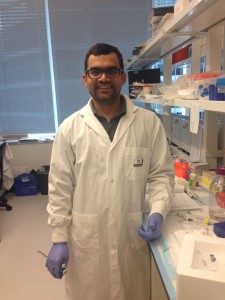
Meraj Alam Khan, B.Sc., M.Sc., PhD.
Research Associate
My work focuses on understanding the molecular mechanisms of NET formation, particularly relevant to transcription, pH, airway inflammation, effects of genetic deficiencies (surfactant protein D, MUC5, C3G defects) in immune response, and identifying NETosis inhibitory drugs. I use transcriptomics, animal models and samples from patients, and coordinate lab activities.
Meraj Alam Khan, B.Sc., M.Sc., PhD.
Research Associate
My work focuses on understanding the molecular mechanisms of NET formation, particularly relevant to transcription, pH, airway inflammation, effects of genetic deficiencies (surfactant protein D, MUC5, C3G defects) in immune response, and identifying NETosis inhibitory drugs. I use transcriptomics, animal models and samples from patients, and coordinate lab activities.
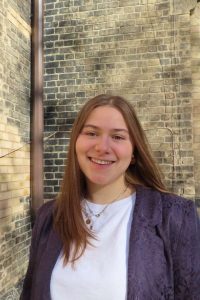
Savina Cammalleri
Research Student
NETs are involved positively and negatively affecting infectious, inflammatory and autoimmune diseases. I explore the potential involvement of NETosis in autoimmune conditions. I use Sytox Green fluorescence kinetics recordings and immunoconfocal microscopy to study both NOX-dependent and -independent pathways of NETosis.
Savina Cammalleri
Research Student
NETs are involved positively and negatively affecting infectious, inflammatory and autoimmune diseases. I explore the potential involvement of NETosis in autoimmune conditions. I use Sytox Green fluorescence kinetics recordings and immunoconfocal microscopy to study both NOX-dependent and -independent pathways of NETosis.

Smitha Matthews, PhD.
Research Volunteer
My work focuses on establishing the role of tyrosine kinases in NET formation. I use various tyrosine kinase inhibitors in NET formation assays, to determine how these kinases regulate different sources of ROS to regulate NET formation. I also explore how various stem cells regulate immune response.
Smitha Matthews, PhD.
Research Volunteer
My work focuses on establishing the role of tyrosine kinases in NET formation. I use various tyrosine kinase inhibitors in NET formation assays, to determine how these kinases regulate different sources of ROS to regulate NET formation. I also explore how various stem cells regulate immune response.

Mithunan Ravindran, MD.
Research Student
My research focuses on identifying serum components responsible for suppressing NET formation. I use neutrophils isolated from healthy donors and patients with cystic fibrosis, to identify inhibitory factors by doing ROS and NETosis assays. I also explore the involvement of NETs in COVID-19, and other infectious and inflammatory lung diseases.
Mithunan Ravindran, MD.
Research Student
My research focuses on identifying serum components responsible for suppressing NET formation. I use neutrophils isolated from healthy donors and patients with cystic fibrosis, to identify inhibitory factors by doing ROS and NETosis assays. I also explore the involvement of NETs in COVID-19, and other infectious and inflammatory lung diseases.
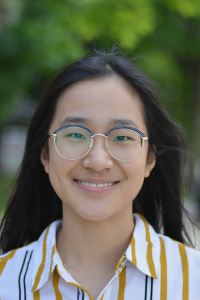
Zi Xuan (Jessica) Zhang
Research Student
My studies focus on understanding the roles of NETosis in COVID-19. I conduct NETosis assays using healthy human neutrophils, summarize the effects of NETs in COVID-19 mechanical ventilation/drugs, update COVID-19 and NETosis-related publications for researchers in a quickly understandable format (www.netosis.org) and for general public in a simple format (netosis_org instagram).
Zi Xuan (Jessica) Zhang
Research Student
My studies focus on understanding the roles of NETosis in COVID-19. I conduct NETosis assays using healthy human neutrophils, summarize the effects of NETs in COVID-19 mechanical ventilation/drugs, update COVID-19 and NETosis-related publications for researchers in a quickly understandable format (www.netosis.org) and for general public in a simple format (netosis_org instagram).
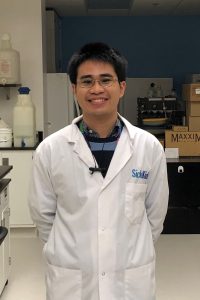
Harvard Tran
Graduate Student (MSc)
My research focuses on understanding the mechanisms mitigating inflammation-induced airway damage. Serotonin could suppress ROS production, hence, NETosis. Adiponectin and citrulline can regulate airway inflammation. I conduct experiments to delineate the roles of these regulators in NETosis and NET-induced cell death using human neutrophils, as well as epithelial, endothelial, and neuroendocrine cells.
Harvard Tran
Graduate Student (MSc)
My research focuses on understanding the mechanisms mitigating inflammation-induced airway damage. Serotonin could suppress ROS production, hence, NETosis. Adiponectin and citrulline can regulate airway inflammation. I conduct experiments to delineate the roles of these regulators in NETosis and NET-induced cell death using human neutrophils, as well as epithelial, endothelial, and neuroendocrine cells.

Dhia Azzouz
Graduate Student (PhD)
My studies discovered how ROS induces NETosis by establishing that ROS-induced oxidative DNA damage and repair relax chromatin for NETosis. My work showed that UV simultaneously induces both NETosis and apoptosis, prior to which the effects of UV on NETosis was unknown. Currently, I focus on further delineating the molecular mechanisms regulating these pathways, and pathobiology.
Dhia Azzouz
Graduate Student (PhD)
My studies discovered how ROS induces NETosis by establishing that ROS-induced oxidative DNA damage and repair relax chromatin for NETosis. My work showed that UV simultaneously induces both NETosis and apoptosis, prior to which the effects of UV on NETosis was unknown. Currently, I focus on further delineating the molecular mechanisms regulating these pathways, and pathobiology.
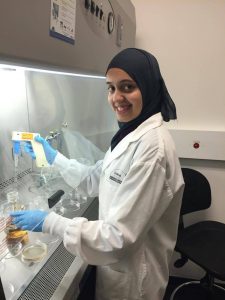
Louiza Azzouz
Research Volunteer
I study the differences in NETosis in females. I induce NETosis in neutrophils isolated from females by various agonists, and measure ROS and NETosis, under normoxic and high CO2 culture conditions. Assays used for this project include Sytox Green, picogreen, flow cytometry and immunocytochemistry and confocal microscopy.
Louiza Azzouz
Research Volunteer
I study the differences in NETosis in females. I induce NETosis in neutrophils isolated from females by various agonists, and measure ROS and NETosis, under normoxic and high CO2 culture conditions. Assays used for this project include Sytox Green, picogreen, flow cytometry and immunocytochemistry and confocal microscopy.
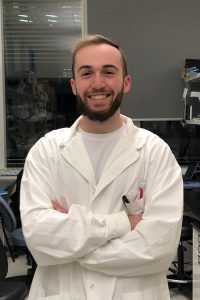
Riley Dow
Research Student
My research focuses on understanding the role of NETosis inhibitory components. Serotonin has the potential to suppress ROS production, hence, NETosis. I conduct experiments using primary human neutrophils, and cultured epithelial and neuroendocrine cells, and analyze the samples by Western blots, and specimen by light and confocal microscopy.
Riley Dow
Research Student
My research focuses on understanding the role of NETosis inhibitory components. Serotonin has the potential to suppress ROS production, hence, NETosis. I conduct experiments using primary human neutrophils, and cultured epithelial and neuroendocrine cells, and analyze the samples by Western blots, and specimen by light and confocal microscopy.
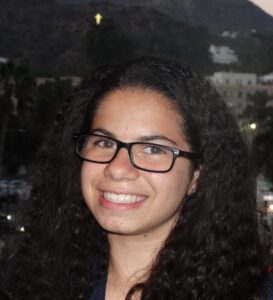
Randa Higazy
Research Student
Pathobiological relevance of METosis is not clearly understood. My work aims to understand the relevance of METosis in the context of neonatal lung inflammation and injury. Experimental procedures used in this project involve isolation of immune cells from inflamed neonatal lungs, Western blots, cell death assays, immunostaining and confocal microscopy.
Randa Higazy
Research Student
Pathobiological relevance of METosis is not clearly understood. My work aims to understand the relevance of METosis in the context of neonatal lung inflammation and injury. Experimental procedures used in this project involve isolation of immune cells from inflamed neonatal lungs, Western blots, cell death assays, immunostaining and confocal microscopy.

Sheng Han Li
Research Student
Our lab discovered a unique form of UV-induced neutrophil death, in which, both NETosis and apoptosis occurs simultaneously. I conduct NETosis assays using human neutrophils to understand the steps involved in UV-induced NETosis. I also explore the roles of collectins in NETosis, update websites, and participate in organizing iCLIIP2021 NETosis conference.
Sheng Han Li
Research Student
Our lab discovered a unique form of UV-induced neutrophil death, in which, both NETosis and apoptosis occurs simultaneously. I conduct NETosis assays using human neutrophils to understand the steps involved in UV-induced NETosis. I also explore the roles of collectins in NETosis, update websites, and participate in organizing iCLIIP2021 NETosis conference.
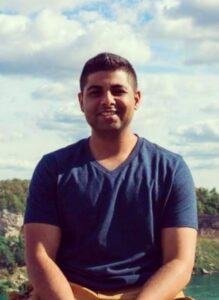
Zubair Sabzali, MD.
Research Student
Neutrophil Extracellular Traps (NETs) have been implicated in the killing of cancer cells or the promotion of metastasis. My work aims to identify the role of NETs in glioblastoma cells using cultured cells and primary neutrophils. This project aims to understand the mechanistic details of NETs on glioblastoma.
Zubair Sabzali, MD.
Research Student
Neutrophil Extracellular Traps (NETs) have been implicated in the killing of cancer cells or the promotion of metastasis. My work aims to identify the role of NETs in glioblastoma cells using cultured cells and primary neutrophils. This project aims to understand the mechanistic details of NETs on glioblastoma.